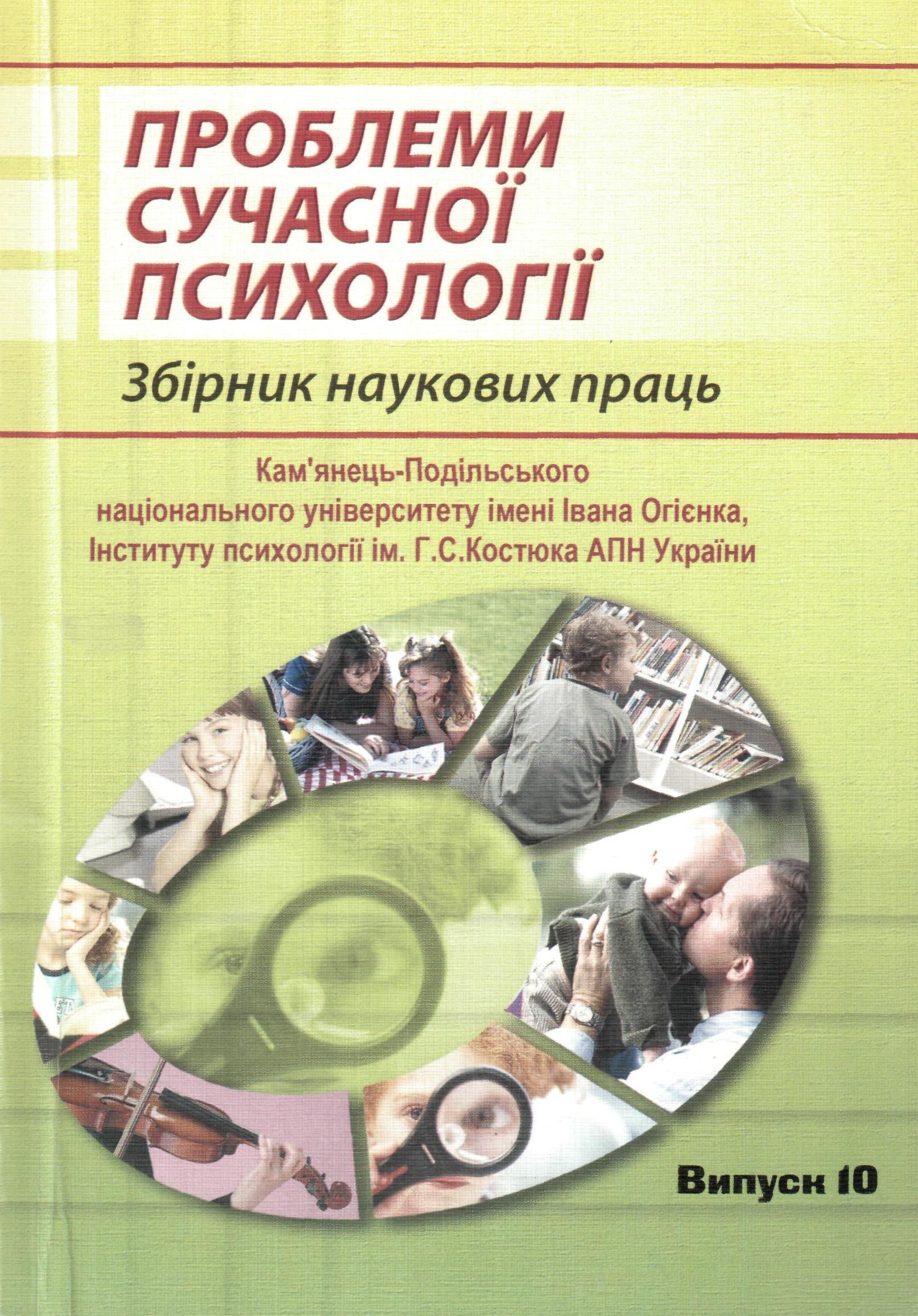Новий підхід до дослідження “цінностей у дії”: переваги, досвід, застосування для вивчення чинників емоційного вигорання педагога
DOI:
https://doi.org/10.32626/2227-6246.2010-10.%25pКлючові слова:
емоційне вигорання, попередження емоційного вигорання педагога, позитивні цінності, “сильні” властивості характеру.Анотація
Стаття містить опис нового опитувальника “Цінності у дії” (Values in
action – VIA), розробленого М.Селігманом, К.Петерсоном і Н.Парк [2004]
для дослідження “позитивних” цінностей (чеснот), дотримування яких
забеспечує формування в людини “сильних” властивостей особистості
(character strengths) і досягнення відчуття психологічного і суб’єктивного
благополуччя. Розглядаються результати емпіричного дослідження ролі
позитивних цінностей і відповідних їм властивостей особистості у
попередження емоційного вигорання педагога. Окреслено перспективи
подальших досліджень з використанням даного опитувальника.
Посилання
Булатевич Н.М. Синдром емоційного вигорання вчителя:
Автореф. дис….канд. психол. наук: 19.00.04. – Київ, 2004.
Джелілова Л.Р. Психологічні особливості розвитку профе
сійного мислення майбутніх вчителів початкових класів:
Автореф. дис…..канд. психол. наук: 19.00.07. – Київ 2008.
Зайчикова Т. В. Психологічні особливості прояву синдрому
емоційного вигорання у студентів // Психологічна теорія і
технологія навчання. Актуальні проблеми психології. –
Том 8. – Випуск 2 / За ред. С.Д.Максименка, М.Л.Смуль
сон. – Київ, Міленіум, 2006.
Знанецька О.М. Методика дослідження феномена психоло
гічного благополуччя: опис, адаптація, застосування//
Вісник Дніпропетр. ун ту. Сер. “Педагогіка і психологія”. –
Дніпропетровськ, 2006. – Вип. 9. – С. 40 46.
Карамушка Л. М., Зайчикова Т. В. Проблема синдрому
“професійного вигорання” в педагогічній діяльності в зарубіжній та вітчизняній психології // Актуальні проблеми
психології: Наукові записки Ін ту психології ім. Г.С.Костюка
АПН України. – К.: Нора Друк, 2001. – Вип. 21. – С. 210
Орел В. Е. Феномен “выгорания” в зарубежной психологии:
эмпирические исследования и перспективы // Психологи
ческий журнал. – 2001. – Т. 22, № 1. – С. 90–101.
Райгородский В.Г. Практическая психодиагностика.
Методика и тесты: Уч. пособие. – Самара: Изд.дом
“БАХРАХ”, 1998. – 672 с.
Рукавишніков О.О. Особистісні детермінанти і організаційні
фактори генезису психічного вигорання педагога: Дис….
канд. психол. наук. – Ярославль, 2001. – 173 с.
Скворцова Ю.В. Разработка методики самооценки мета
когнитивных знаний и метакогнитивной активности //
Ярославский психологический вестник. – Вып. 14. – М. –
Ярославль: Изд во “Российское психологическое общество”,
– С. 65 70.
Форманюк Т.В. Синдром “эмоционального сгорания” как
показатель профессиональной дезадаптации учителя//
Вопросы психологи. – 1994. – № 6. – С. 56 64.
Abu Hilal MM, el Emadi AA. Factor structure and reliability of
burnout among Emirate and Palestinian teachers. Psychol Rep.
Oct; 87(2): 597 610.;
Beck, C.L., & Gargiulo,R.M. (1983). Burnout in teachers of
retarded and nonretarded children. Journal of Educational
Research, 76, 169 173.
Demirel Y., Guler N., Toktamis A. Burnout among high school
teachers in Turkey.// Professional Med J Sept 2005; 12(3):
316.
Dьckers Klichowski, S. (2005). Burnout bei Lehramtsanwar&
tern im Primarbereich [Burnout in teachers on probation in pri
mary schools]. Berlin: Logos.
Evers, W. J. G., Brouwers, A., & Tomic, W. (2002). Burnout
and selfefficacy: A study on teachers’ beliefs when implement
ing an innovative educational system in the Netherlands. Brit
ish Journal of Educational Psychology, vol. 72, pp. 227 243.
Farber B.A. Stress and burnout in suburban teachers // Journal
of Educational Research. – 1984. Vol.77, №6. – Р.325 331.
Flugel, J.C. Studies in feeling and desire. – London. – 1985.
Gold Y. Does teacher burnout begin with student teaching //
Education. – 1985. –Vol.105, №3. – Р.254 257.
Maslach, C., & Jackson, S. E. (1986). Maslach Burnout Inventory
Manual (2nd edn.). Palo Alto, CA: Consulting Psychologists Press.
Nosenko, E. On the syndromological approach to studying the
personality aspects of teaching stress//Abstracts of the XXIX
International Congress of psychology. Berlin. Germany. July
25, 2008. In Introductional Journal of psychology. – Vol
Issue ѕ. June – August 2008. p. 507 .
Pedrabissi L, Rolland JP, Santinello M. Stress and burnout
among teachers in Italy and France. J Psychol. 1993 Sep;
(5):529 35.
Peterson, C., & Seligman, M. E. P. (2004). Character strengths
andvirtues: A handbook and classification. Washington, DC:
American Psychological Association.
Schwarzer, R., Schmitz G. S., & Tang, C. (2000). Teacher burn
out in Hong Kong and Germany: a cross cultural validation of
the Maslach Burnout Inventory. Anxiety, Stress & Coping, vol.
, no. 3, pp. 309 327.
Schorn, N. K. & Buchwald, P. (2007). Burnout in Student
Teachers. In P. Roussi, E. Vasilaki, K. Kaniasty, & J. D. Barker
(Eds.), Electronic Proceedings of the 27th Conference of the
STAR Society, 13 15 July 2006, University of Crete, Rethymnon
(pp. 150 – 159).
Van Horn JE, Schaufeli WB, Greenglass ER, Burke RJ. A
Сanadian Dutch comparison of teachers’ burnout. Psychol Rep.
Oct; 81(2): 371 82.
Zimmermann L., Wangler J., Unterprink T., Pfeifer R.,
Wirschung M., Bauer J. Mental health in a sample of German
teachers at the beginning of their occupational career// Ab
stracts of the XXIX International Congress of psychology. Ber
lin. Germany. July 20 25, 2008. In Introductional Journal of
psychology. – Vol 43. Issue ѕ. June – August 2008. p.
##submission.downloads##
Як цитувати
Номер
Розділ
Ліцензія
Редакція має повне право публікувати у Збірнику оригінальні наукові статті як результати теоретичних і експериментальних досліджень, які не знаходяться на розгляді для опублікування в інших виданнях. Автор передає редколегії Збірника права на розповсюдження електронної версії статті, а також електронної версії англомовного перекладу статті (для статей українською та російською мовою) через будь-які електронні засоби (розміщення на офіційному web-сайті Збірника, в електронних базах даних, репозитаріях та ін).
Автор публікації зберігає за собою право без узгодження з редколегією та засновниками використовувати матеріали статті: а) частково чи повністю в освітніх цілях; б) для написання власних дисертацій; в) для підготовки абстрактів, доповідей конференцій та презентацій.
Автор публікації має право розміщувати електронні копії статті (у тому числі кінцеву електронну версію, завантажену з офіційного web-сайту Збірника) на:
- персональних web-ресурсах усіх Авторів (web-сайти, web-сторінки, блоги тощо);
- web-ресурсах установ, де працюють Автори (включно з електронними інституційними репозитаріями);
- некомерційних web-ресурсах відкритого доступу (наприклад, arXiv.org).
Але в усіх випадках обов’язковою є наявність бібліографічного посилання на статтю або гіперпосилання на її електронну копію, що містяться на офіційному сайті Збірника.






